Table of contents
- What is time recording?
- Possible functions of time recording
- What needs to be considered when recording time?
- Why is time recording important and what benefits does it provide for companies and employees?
- Who is legally required to use time recording?
- Does trust-based working time contradict time recording?
- From when and how is time recording mandatory?
- What methods can companies and self-employed people use to record time?
- How long do you have to keep data?
- What does time recording include?
- What tools can you use for legally compliant time recording?
- Conclusion on time recording: valuable for almost everyone
For a long time, companies were legally only required to document overtime and work on Sundays and public holidays. Meanwhile, recording work hours of employees is mandatory for almost every company. The Federal Labor Court (BAG) in Erfurt made a far-reaching
ruling on time recording in September 2022.What is time recording?
Time recording is the recording and saving of work and contract times from the beginning to the end of a working day or a contract. Excluded are all unpaid breaks and rest periods. Time recording can, for example, refer to individual tasks, work steps, or projects. The two main types of time recording are personal attendance recording and contract time tracking.
Possible functions of time recording
Online time clock: Employees log in with a click from a (mobile) device such as a PC, cell phone, or tablet. With the help of
time tracking software such as
ZEP or
Kenjo.
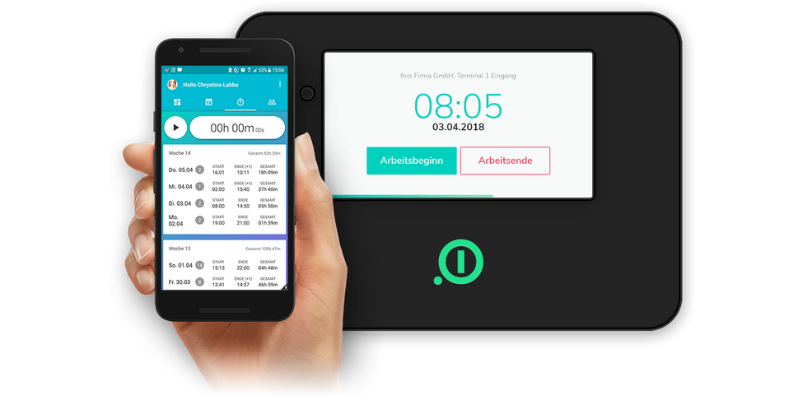
Time recording with example tool absence.io
Mobile time recording: Employees allocate the working time of their individual actions from anywhere to the corresponding projects (e.g. at customer sites).
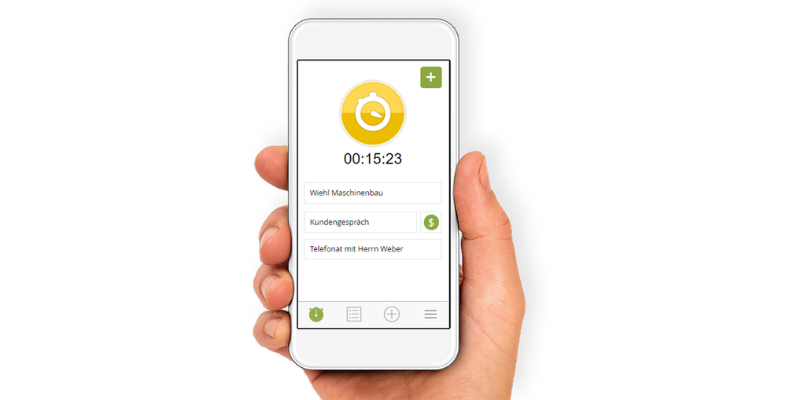
Time recording via app on a mobile phone with clockodo
Time clock terminals: Employees log in and out at the terminal with a transponder.
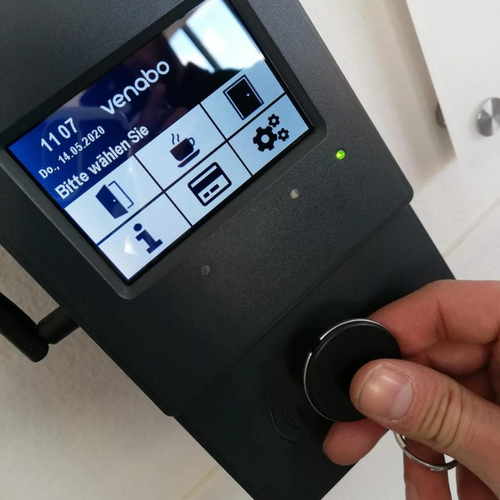
Time clock terminal from venabo.ZEIT
Surcharge: Surcharges are computed automatically.
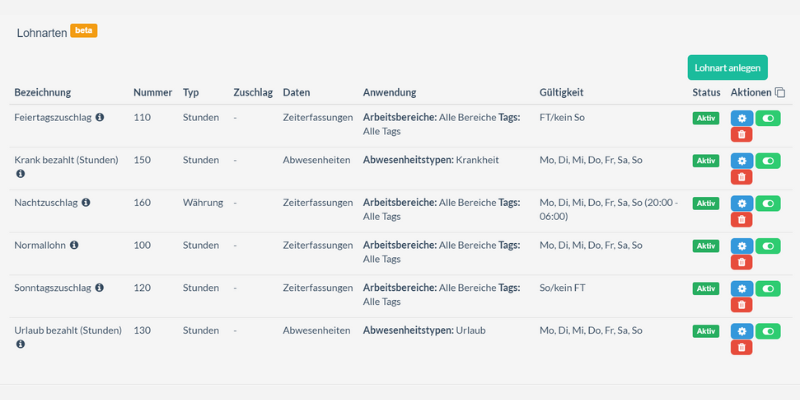
Time recording with papershift
Working time account: The time of presence and leave is recorded and documented in the working hours account.
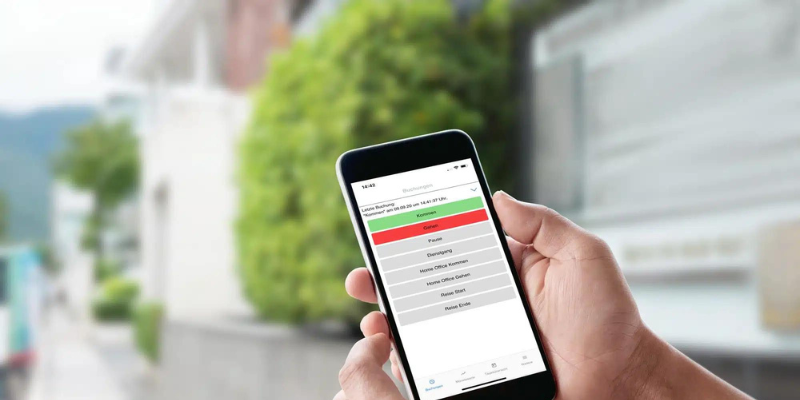
Time recording with ZMI
Evaluation: Employees can access and evaluate the data of their time recording.
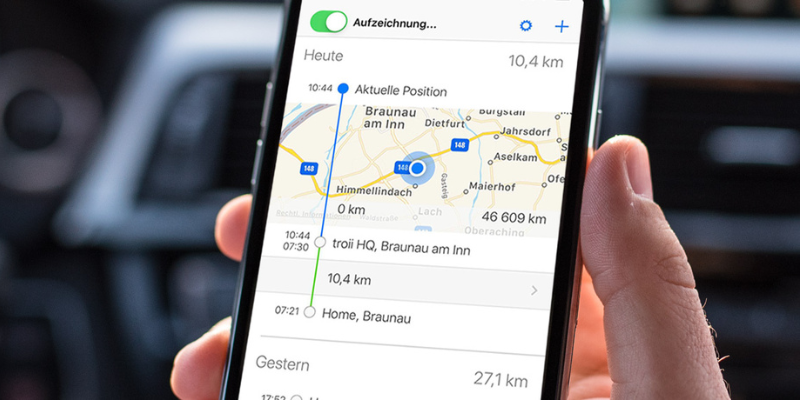
Time recording with TIIME
What needs to be considered when recording time?
Here you will find all the important facts you need to know about time recording in a nutshell. A more detailed explanation is provided below:
Who has to record work hours?
Before the verdict on time recording, certain groups of individuals had to document their working hours:
- Minimally employed under the Minimum Wage Act (MiLoG)
- Industries under the Act to Combat Undeclared Work and Fraudulent Social Security (SchwarzArbG)
The BAG clarified in its judgment (1 ABR 22/21): all employers must implement a working hours recording system and employees within the meaning of § 5 Para. 1 Sentence 1 Works Constitution Act (BetrVG) are obliged to use it. Exempt from this are according to § 18 Para. 1 Working Time Act (ArbZG):
- Executive employees within the meaning of § 5 Para. 3 BetrVG and chief physicians,
- Heads of public offices and their representatives as well as public employees who are authorized to make autonomous decisions in matters of personnel,
- Employees who share a household with those entrusted to them and who independently nurture, care for or bring them up and and
- the liturgical area of churches and religious communities.
From when and how do you have to record times?
The obligation to introduce a working hours recording system takes effect immediately. Employers have a great deal of leeway. According to the law, time recording does not have to be done electronically or digitally. Why it still makes sense to do so, you'll find out in this article.
How long do you have to keep data?
Normally, time recording is used for payroll accounting. According to tax law, business-relevant documents must be kept for six years, but for overtime, the period is even ten years.
What does time recording include?
According to § 3 Para. 2 No. 1 Workplace Safety Act (ArbSchG), employers must implement an objective, reliable and accessible system and use it properly. It records
- the start and the end of working hours,
- breaks and
- overtime
Why is time recording important and what benefits does it provide for companies and employees?

Time registration with the software ZEP
Workplace time recording serves two main purposes: first, it ensures fair payment and protection for employees as per the Working Hours Act (ArbZG). Second, it enables more flexibility for employees and companies, helping them to reach their goals faster.
Time recording has many positive side effects. But above all, it is necessary if you want to introduce flexible and effective working time models. The greatest benefits are
- Transparency,
- Flexibility,
- Measurability,
- Proof,
- Comparability and
- Planning security.
The specific benefits depend on one's point of view.
Advantages of time recording for you as an employer:
- Time recording allows for flexible working hours and remote work: Whether early riser or late sleeper, your employees work when they are most productive.
- You can be sure that your employees stick to the agreed working hours.
- Your employees can balance overtime and minus hours (within a defined framework) themselves. Your effort is reduced to an absolute minimum.
- You have everything in black and white, thus avoiding any misunderstandings and discussions.
- Your job processing has a fact-based calculation basis for all resources (effort, costs, use of personnel).
- Your accounting has a basis for payroll accounting.
- Based on your protocols, you can calculate recurring tasks better, easier and more reliably.
- The budget is continuously monitored. You can intervene before it is exceeded.
- You automatically comply with labor law regulations (e.g. the maximum working time of eight hours per day according to § 3 ArbZG).
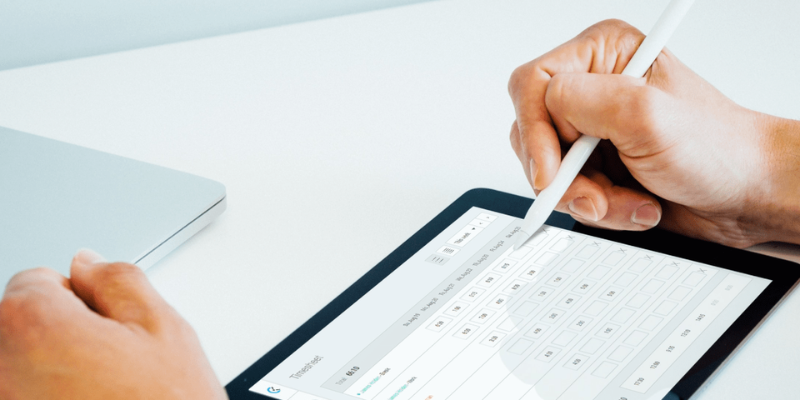
Time recording with clockify
Advantages of time recording for you as an employee:
- Time recording allows for flexible working hours and remote work: You can attend more private appointments and improve your work-life balance.
- You don't have to worry about uncomfortable conversations, overtime is transparent.
- Leave days are visible to everyone, avoiding overlaps.
- Absences are visible to everyone, which makes coordination within the team easier.
- Active logging promotes your ability to work in an organized manner.
- You can identify time wasters more easily and batch them into meaningful units.
- Every minute of overtime is recorded and payed.
- Legal requirements such as your rest periods are recorded and complied with.
- Checking in and out is super easy and from anywhere. Travel distances can be automatically recorded.
Who is legally required to use time recording?
There are some professions in which customers are billed for these working and travel times. Among other things, craftspeople and custom software developers have therefore dealt with time recording even before the court ruling. There are also industries where it has long been compulsory:
- Minimally employed under Minimum Wage Law (MiLoG)
- Branches under Anti-Black Economy Act (SchwarzArbG)
In May 2019, the European Court of Justice (ECJ) ruled that EU companies must record their employees' working hours (C-55/18 - CCOO). In September 2022, the German Federal Labor Court (BAG) clarified with a principal judgement (1 ABR 22/21) that all employers must record the working times of their employees.
It specifically states: Time recording must indeed take place. It is not enough to simply offer employees time recording. So all employers must implement a system for recording working hours, and all workers, as defined in § 5 par. 1 clause 1 Works Constitution Act (BetrVG), must use it.
Only a few groups are exempted from this obligation according to § 18 par. 1 Working Hours Act (ArbzG):
- Executive employees as described in § 5 par. 3 BetrVG and chief doctors,
- Heads of public departments and their deputies as well as public employees, who have the authority to make autonomous decisions regarding personnel matters,
- Workers who live in the same household as the people entrusted to them and mentor, care or look after them independently,
- The liturgical sector of churches and religious communities.
As you can see, this regulation is relevant even for small firms like start-ups and self-employed individuals who hire personnel. Those who do not implement a working hours recording system violate § 3 par. 2 no. 1 Workplace Safety Act (ArbSchG) and risk a fine of up to EUR 30,000 (§ 25 par. 1 no. 2a, par. 2 Workplace Safety Act).
Does trust-based working time contradict time recording?
Time recording is mandatory, but the inspection of recorded working hours is not. Therefore, trust-based working time is still possible. Clear layout rules should be communicated and recorded times should be randomly checked.
From when and how is time recording mandatory?
There is no transition period or similar. The obligation to implement a working hours recording system is effective immediately. The good news: Employers have a lot of freedom to design. What many don't know: The legislator doesn't force companies to implement time recording electronically or digitally.
What methods can companies and self-employed people use to record time?
In theory, you can record working times on your old Diddl pads. Why pencil and paper definitely aren't the best alternatives should be obvious. It is easier to use a digital time clock on the PC, an app, a terminal, or at least an Excel file. By the way, companies are allowed to delegate time recording to their employees.
How long do you have to keep data?
This question can be answered with the Working Hours Act, the Minimum Wage Act (MiLoG), and the Employee Dispatch Act (AEntG): You must keep your documentation for at least two years. According to tax law, there is a six-year retention period for documents relevant for taxation. For overtime, the period is even ten years.
What does time recording include?
§ 3 par. 2 no. 1 Workplace Safety Act (ArbSchG) requires employers to establish an objective, reliable as well as accessible system and apply it properly. So you need record the following:
- Start of working hours
- End of working hours
- Breaks
- Overtime
We recommend
Empfehlenswerte Zeiterfassungssoftware-Anbieter
You can find recommended time tracking software providers on our software comparison platform OMR Reviews. There, we have listed over 150 time tracking software providers that you can use to track your working hours. So take a look and compare the software with the help of authentic and verified user reviews:
Conclusion on time recording: valuable for almost everyone
Time recording has been helpful or even essential in some sectors for a long time. The many advantages for employers as well as employees make it clear why this is the case. Since September 2022, time recording is not only a useful tool, but mandatory for almost all companies. Of course, you can fall back on Excel, but the user-friendly and time-saving alternative is to use a time recording software, which is even available for a small budget. So, what are you waiting for? Check out the tools on OMR Reviews!










